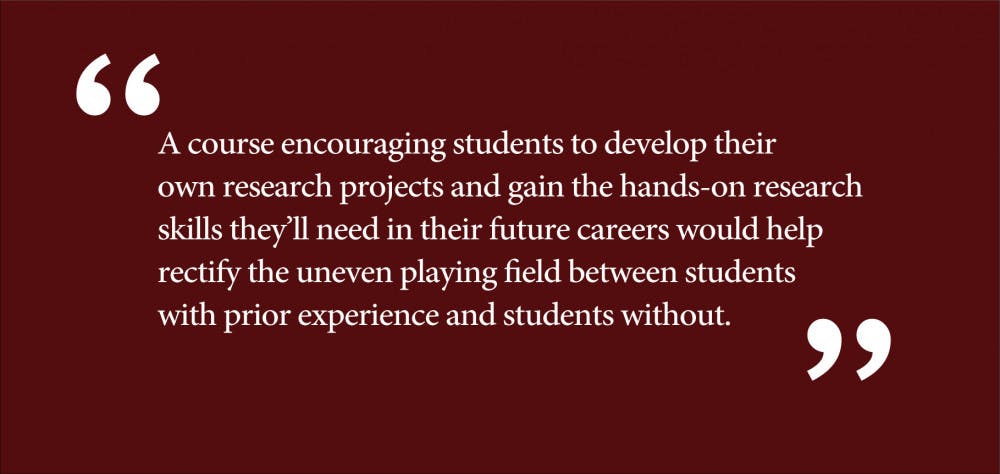If you are a STEM concentrator at Brown, research is key. The sooner an undergraduate gets into research, the better and more competitive their resume will be. To students either deciding sophomore spring they want to concentrate in STEM without any prior research experience, or students who come from disadvantaged educational backgrounds and were not exposed to research early in their careers, peers coming to Brown with previous research experience can intimidate or disadvantage them. This discrepancy puts students on an uneven playing field for the internship and job markets, or the Brown research community. A course encouraging students to develop their own research projects and gain the hands-on research skills they’ll need in their future careers would help rectify the uneven playing field between students with prior experience and students without. Though such courses exist for a larger number of upper-level STEM classes, for example BIOL 1870: “Techniques and Clinical Applications in Pathobiology,” they need to be available earlier on for students who are beginning their STEM careers at a seeming disadvantage.
The issue of getting new college graduates, or even current students, jobs or opportunities in STEM industries without prior experience is slowly growing. Quickly, more and more undergraduates are doing research in their short time during college. According to a 2007 study by the National Science Foundation, 72 percent of chemistry students and 74 percent of environmental science students applying for graduate schools had research experience. Now, having undergraduate research experience is crucial, and many of these research experiences, such as fellowships and associate positions, prefer candidates with prior experience in research.
Just as the job market is advancing toward favoring applicants with a basic university degree as the standard amount of education and practice, applicants with previous research experience and/or publications are more likely to be favored than those with no research experience at all — even for entry-level jobs. According to a study done by TalentWorks, 61 percent of entry-level jobs required at least three years of experience. But students need jobs and internships for experience. These two facts seem at odds with each other because they are; the more competitive the job market, the more likely that applicants teeming with an eagerness to learn but possessing a scant resume will slip through the cracks.
There are already ways Brown gives students a fair chance at succeeding through structured courses introducing concepts that may not have been taught to students in high school. These are classes that bring students from varying backgrounds up to speed: Think MATH 0090: “Introductory Calculus” and other introductory courses that are essential to bridge the gaps from a multitude of high school educations. This puts everyone on a relatively even playing field, ensuring students without the proper background can get the knowledge they need to succeed before pursuing their respective paths. These classes, as well as others, were crucial for students like me who did not realize they were interested in STEM until either very late in high school or early on in college. Why would we not have a similar system for students oriented toward skills in research?
A course that introduces the basic procedures any lab requires will properly prepare us for research jobs we apply to and positions we may hold during the academic year with faculty, ensuring we are properly prepared to begin cutting-edge research without the need for extensive training on the job. And if not applicable during the school year, this will better prepare students for summer positions where the application process is known to be lengthy and especially competitive for students with no prior lab experience or knowledge of procedures. A course introducing research and encouraging students to think critically would give those without a research background a fighting chance during the application process, especially if they are able to take charge of their own research projects or produce a thesis at the end of it.
Previous experience or a fluffy resume is obviously not a surefire way to land the research position of your dreams, but having relevant experience is always helpful. Students can be discouraged when a research listing says “no previous experience required, but preferred,” and they are often passed over. Of course, reaching out to faculty directly and getting involved in a specific project is always an option, but students can only benefit from having experience as soon as possible. A course at Brown bridging the gap between students with and without research experience could be the first step toward equalizing students who come from different backgrounds and making them more competitive for research jobs and graduate programs.
Rachael Schmidt ’21 can be reached at rachael_schmidt@brown.edu. Please send responses to this opinion to letters@browndailyherald.com and other op-eds to opinions@browndailyherald.com.





